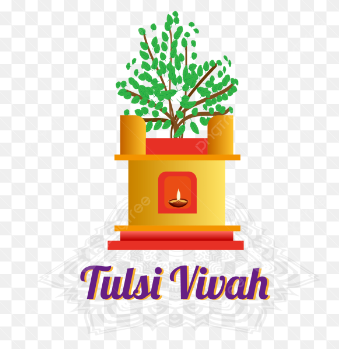Tulsi Vivah 2024 Festival: Significance, Rituals, and Modern Celebrations
 Tulsi Vivah 2024
Tulsi Vivah 2024Ceremonial marriage of the Tulsi plant (holy basil) to Lord Vishnu.
festival
Tulsi Vivah 2024
religion
Hinduism
Date
12-11-2024
day
Tuesday
Muhurat time
--
Duration
21
 Festival Date
Festival Date12 Nov, 2024
Tulsi Vivah
Today Date
02 Jan, 2025
Tulsi Vivah
Time Remaining
Why we Celebrate Tulsi Vivah ?
The ceremonial marriage of the Tulsi plant (holy basil) to Vishnu or his avatar, Krishna. It signifies the end of the monsoon and the beginning of the wedding season, promoting spiritual purity and devotion.
Important Days
Meditation and Mantras
Tulsi Vivah 2024: Exploring Traditions and Modern Festivities
The Tulsi Vivah festival marks the ceremonial marriage of the sacred Tulsi plant to Lord Vishnu. This Hindu festival is celebrated with fervor and devotion, symbolizing the ushering of auspiciousness and prosperity. In 2024, Tulsi Vivah will hold its traditional grandeur, offering spiritual and cultural enrichment to participants.
Understanding the Significance of Tulsi Vivah 2024
The Tulsi plant is revered in Hindu households for its spiritual significance and medicinal properties. Tulsi Vivah represents the union of Tulsi with Lord Vishnu in his form as Shaligram or Krishna. This festival symbolizes the end of the monsoon and the beginning of the wedding season in India. It is believed that performing Tulsi Vivah brings prosperity, harmonious relationships, and spiritual upliftment in one’s life.
Tulsi Vivah 2024 Date and Timing
In 2024, Tulsi Vivah will be observed on November 12th. The timings for the rituals are crucial as they align with the auspicious timings of Dwadashi Tithi. Devotees usually perform the rituals in the evening, when it is considered most favorable for divine blessings.
Mythological Stories Behind Tulsi Vivah 2024
According to Hindu mythology, Tulsi Vivah narrates the tale of Vrinda, an ardent devotee of Lord Vishnu, who was married to Jalandhar, a demon king. Through a series of divine interventions, Vrinda was transformed into the Tulsi plant, and Lord Vishnu promised to marry her in her next birth. This story exemplifies devotion, sacrifice, and the triumph of good over evil.
Vedic Astrology and Tulsi Vivah 2024
Astrologically, Tulsi Vivah holds significance as it marks the transition of the Sun into Scorpio, heralding the beginning of the auspicious period for marriages and other religious ceremonies. The alignment of celestial bodies during this time enhances the spiritual energy, making it an ideal time for rituals and prayers.
Tulsi Vivah 2024: Astrological Insights
The divine energies during Tulsi Vivah are believed to cleanse negative influences from ones life. Astrologers suggest that participating in these rituals can mitigate the effects of malefic planetary positions, particularly for those experiencing hardships related to marriage and relationships.
Rituals and Practices of Tulsi Vivah 2024
The rituals of Tulsi Vivah are performed with meticulous devotion. The Tulsi plant is adorned like a bride with colorful sarees, jewelry, and flowers. A mandap is set up, and the idol or photograph of Lord Vishnu is placed alongside Tulsi. Devotees conduct a wedding ceremony, complete with Vedic chants, prayers, and offerings.
Health and Spiritual Benefits of Tulsi Vivah 2024 Rituals
Tulsi is known for its medicinal properties, including its ability to boost immunity and alleviate stress. Spiritually, the rituals of Tulsi Vivah are believed to purify the mind and soul, fostering a sense of peace and well-being. Engaging in these rituals helps devotees cultivate inner strength and spiritual clarity.
Mantra Chanting During Tulsi Vivah 2024
Mantra chanting is an integral part of Tulsi Vivah, with each mantra carrying specific vibrations that invoke divine blessings. Devotees chant the name of Lord Vishnu and the Tulsi mantra, which is believed to enhance spiritual consciousness and bring about positive transformations in life.
Tulsi Vivah 2024 in Modern Times
In contemporary times, Tulsi Vivah has evolved to include community gatherings, online streaming of rituals, and eco-friendly celebrations. Many households host virtual ceremonies, allowing family members across the globe to participate. The essence of the festival remains intact, emphasizing devotion, togetherness, and sustainable practices.
Conclusion
Tulsi Vivah 2024 is not just a festival; it is a celebration of faith, devotion, and cultural heritage. As devotees prepare for this auspicious occasion, they embrace the spiritual and communal aspects that Tulsi Vivah offers. Whether through traditional rituals or modern adaptations, the festival continues to inspire and unite people in their spiritual journeys.
```
Charity and Donations
Joy Stories Foundations
Joy Story Foundation is a section-8, non-profit organization founded in November 2019, registered with Ministry of Corporate Affairs, Government of India. It aspires to build stories around “Joy for Everyone” by practicing the values of collective philanthropy and by maintaining utmost transparency in order to achieve it. Our vision is to ensure that we do our bit to free the world of gloom, sorrow, deprivation, pessimism, and pain by inducing small positive moments to bring joy in the world. And we would go to any extent to achieve that, irrespective of geographical boundaries, religion, age, color or need. Our giving would be completely unbiased, non- religious and non-political.